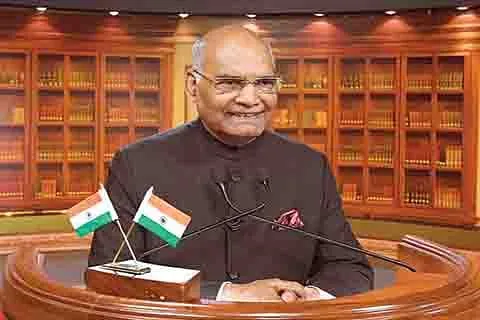President Ram Nath Kovind’s address to the nation, and Indian nationals living overseas on the eve of the 73rd Republic Day was thoughtful. He drew the people’s attention to constitutional values and the successes of last year as well as the continuing trials faced by the country because of the COVID pandemic. He paid tribute to Netaji Subhas Chandra Bose on his 125th birth anniversary. He also spoke of India’s commitment to combat climate change and of its focus on renewable energy which would help the country to move away from hydrocarbons.
Among the many subjects that he touched upon there was perhaps nothing more significant than his few sentences relating to India’s constitution making and constitutional values. The foundational document’s objective to transform a hierarchical, unequal and feudal society into a democratic and egalitarian one was truly revolutionary. The Indian state and people have not fully achieved that high objective but remain committed to it. And that commitment is also encapsulated in the five words in the preamble – that the President mentioned—Democracy, Justice, Equality, Liberty and Fraternity.
Every Republic Day provides an occasion for state institutions and the public to introspect and rededicate themselves to the constitution’s commitments. Every institution and citizen should take special note that the President categorically said that the constitutional values enshrined in the constitution are the “bedrock on which our Republic stands. These are the values that form our collective inheritance”. These are days of great ideological contestation. Amidst these clashes it is imperative that every section of the Indian people and every region of the country pays heed to the President’s wise words. It is equally imperative that the Indian state in all its manifestations makes every citizen and region feel that it is abiding by these “bedrock” values which are our “collective inheritance”. That is the surest way to navigate ideological differences. It is also the surest way to earn global respect for India as a humane democracy.
The President went on to observe: “These values have been accorded primacy in our Constitution in the form of Fundamental Rights and Fundamental Duties. Rights and duties are two sides of the same coin. The observance of Fundamental Duties mentioned in the Constitution by the citizens creates the proper environment for the enjoyment of Fundamental Rights”. In the context of duties he lauded the citizenry for fulfilling the “fundamental duty of rendering national service” in the Swacch Bharat Abhiyan and in the COVID vaccination programme. Earlier Prime Minister Narendra Modi too has stressed the importance of citizens discharging their duties but this is perhaps the first time when a President of India has spoken so explicitly about it and drawn such an explicit linkage between fundamental rights and duties.
It was in 1976 that a list of Fundamental Duties was added to the constitution through an amendment by inserting Article 51A under a new Part IV A in India’s foundational document. Ten duties were listed and an eleventh was added in 2002 through another amendment in 2002. The ‘rendering of national service’ by citizens mentioned by the President is one of the fundamental duties but there are others too. One is particularly relevant to combatting COVID. In his speech the President said, with regard to COVID management “In the fight against the Covid pandemic, it has now become the sacred national duty of every citizen to follow the precautions suggested by our scientists and experts. We have to discharge this duty till the crisis is behind us”.
The President’s emphasis that citizens should observe what is prescribed by science and not take recourse to superstition, misinformation, prejudice or mythology cannot be faulted on any ground. What he did not add, but is obvious, is that this would be so even where science is groping to find answers as it has in case of the covid 19 pandemic. The President has also clearly implied that in situations such as the pandemic a citizen’s duty to follow expert and scientific advice supersedes the right of choice in such matters. This view is unexceptional. Indeed it is ridiculous to extend the right of individual choice to an extent that society is itself endangered. Such a situation has been going on in the United States. But there is another aspect to all this which brings in a fundamental duty mentioned in the constitution. This is “to develop the scientific temper, humanism and the spirit of inquiry and reform”.
Obviously, it would be easier to persuade a people imbued with a “scientific temper” and “humanism” to follow expert and scientific advice not only on covid but other matters too. The inculcation of traits that go into forming a society which shuns mumbo-jumbo and hocus-pocus masquerading as knowledge and wisdom has to be part of the education process from the very beginning. This does not mean that faith or religious traditions have to be abandoned for true spirituality is ennobling and contributes to the building of a humane and caring society.
Thus, Fundamental Duties mentioned in the constitution seek much more than obedience. They are designed to making a people progressive in their outlook. Fundamental duties also cannot absolve the Indian state from doing all it can to uphold the rights and values of citizens. In the 75th year of freedom a progressive and caring India would be a beacon to the world. That should be the aim of India’s national endeavour.
Disclaimer: The views and opinions expressed in this article are the personal opinions of the author. The facts, analysis, assumptions and perspective appearing in the article do not reflect the views of GK.







